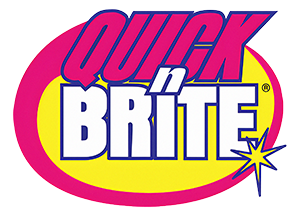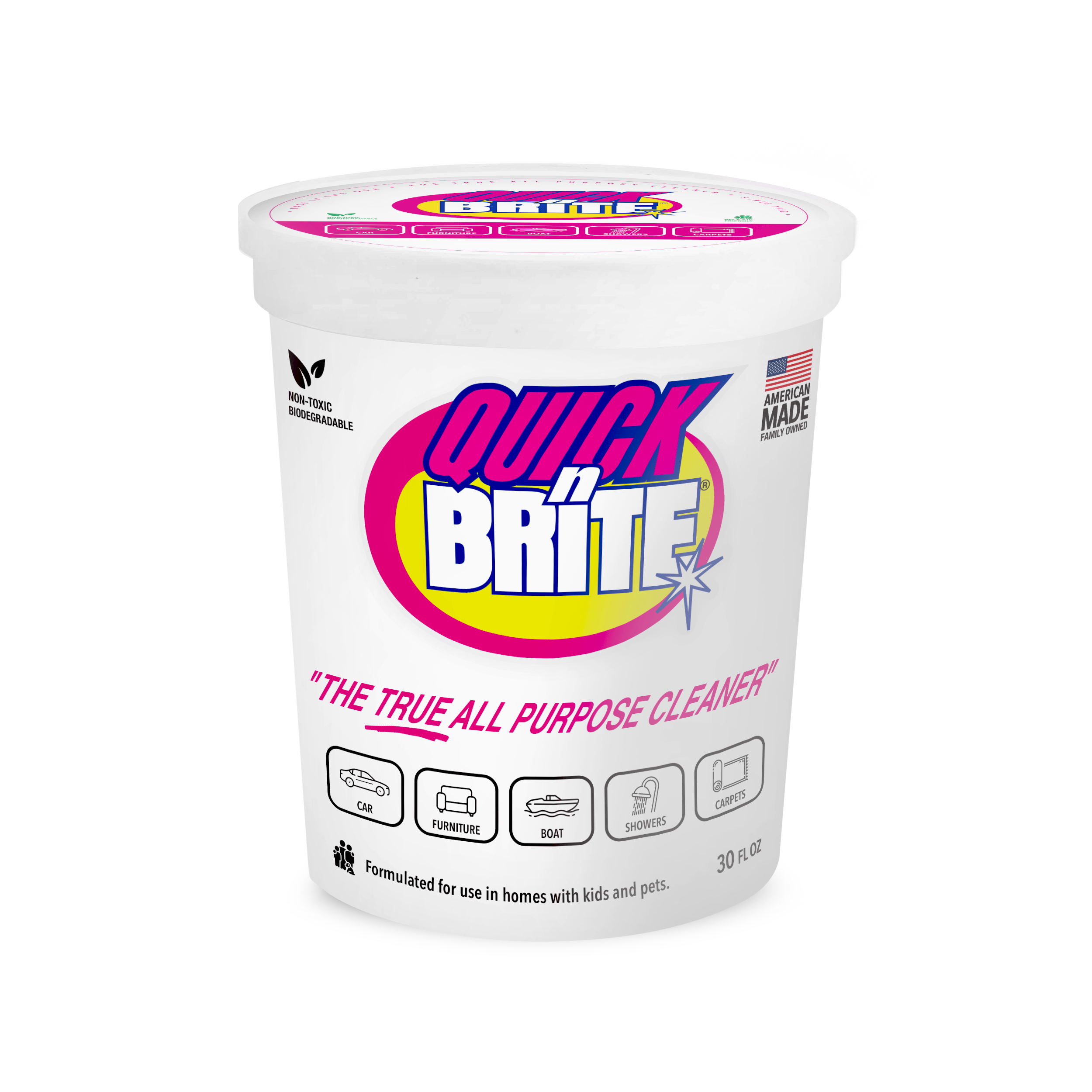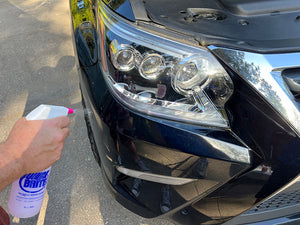A Clear Solution for Sparkling Bathrooms
Transform your bathroom from drab to fab by keeping your glass shower doors spotless! With the right shower glass cleaner, tackling soap scum, hard water stains, and reducing mold and mildew becomes a breeze. Choosing the right cleaner is key—it speeds up cleaning and leaves you with more time for the things you love.
A great shower glass cleaner should handle all the grime on your doors. Whether you're doing a quick daily wipe or a deep clean, it's important to pick a cleaner that suits your needs. Quick ‘n Brite offers everything from ready-to-use sprays to concentrates for every cleaning challenge. And don't forget tools like sponges, squeegees, and microfiber cloths—they keep things streak-free and shiny!
Key Takeaways
- Pick a shower glass cleaner that matches how often and what kind of dirt you deal with.
- The right tools and tips can make your cleaner work even better.
- Choose products that fit your bathroom's needs for the best results.
Identifying Your Cleaning Needs
Before grabbing a cleaner, think about what you're dealing with—your water type, common residues, and any mold or mildew that might need a thorough rinse. By knowing these details, you can choose a cleaner that keeps your glass clear and long-lasting, making your bathroom always feel inviting.
Understanding Hard Water Impact
Hard water, loaded with minerals like calcium and magnesium, can be a real pain for shower glass. It leaves behind hard water stains and limescale, which can damage your glass if not cleaned properly. Tackling these issues promptly can save you from future headaches.
Hard Water Woes:
- White spots from calcium deposits.
- Dullness from magnesium buildup.
Recognizing Common Residues
Shower glass often gets covered in soap scum, grime, and body oils. Knowing what you're dealing with helps you choose the right cleaner. Heavy-duty cleaners might be needed for thick soap scum, while a daily spray can handle lighter grime. This knowledge empowers you to tackle any mess with confidence.
Common Residues:
- Soap scum: A filmy layer that hardens over time.
- Body oils and grime: Attract dirt and can lead to bacteria growth.
Dealing with Mold and Mildew
Bathrooms are perfect for mold and mildew, which can be a health concern. Mold appears in black or green patches, while mildew is usually gray or white. Use a cleaner that tackles these without harming your glass, keeping your bathroom safe and inviting.
Mold and Mildew Tips:
- Spot them early to stop growth.
- Use cleaners that target mold and mildew effectively.
Effective Cleaning Techniques
Keeping your shower doors and tiles clean not only looks good but also extends their life. Regular maintenance and deep cleaning are key to handling tough issues like hard water buildup, making your bathroom a relaxing oasis.
Daily Maintenance Strategies
For daily upkeep, simple habits work wonders. A squeegee is your best friend—use it after each shower to prevent spots and scum on glass shower doors. The Quick ‘n Brite Ultimate Cleaning Kit, with its concentrated spray and microfiber cloths, keeps glass, tiles, and grout clean with minimal effort.
|
Task |
Tool/Agent |
Frequency |
|---|---|---|
|
Water Spot Prevention |
Squeegee |
After each shower |
|
Surface Cleaning |
Quick ‘n Brite Concentrated Spray |
Once daily |
|
Shine Maintenance |
Microfiber Cloth |
As needed |
|
Scum Prevention |
Quick ‘n Brite Cleaning Paste |
As needed |
Deep Cleaning Methods
For stubborn grime and hard water buildup, step up your game. Use the Quick ‘n Brite Cleaning Paste for tiles and grout. For tough stains, let Quick’n Brite Scum Off sit for 30-60 minutes before you rinse. These methods keep your shower looking spotless and inviting.
Stick to these cleaning methods, and your shower will look spotless for years.
Practical Application and Tips
The way you clean can make a big difference. Proper methods and preventive treatments make cleaning easier and help your shower glass last longer, giving you more time to enjoy your sparkling clean bathroom.
Method of Application
Choose a glass cleaner for shower doors that tackles water spots and soap scum. Use a spray bottle for even coverage, and a microfiber towel to wipe in a top-down or side-to-side motion. This approach gets things clean every time.
Addressing Rust, Calcium, and Metal Surfaces
For rust or calcium on fixtures, use a cleaner safe for both glass and metal. A protective coating can stop future buildup. For severe cases, specialized solutions might be needed to restore your fixtures to their original shine.
Preventive Measures and Treatments
Applying a protective coating to shower glass cuts down on water spots and mineral buildup. Ventilation is key to preventing mold and mildew, so keep the air flowing. Wiping down the glass with a sponge after each use helps keep it clear and spot-free, making your cleaning routine a breeze.
Additional Considerations
When picking a cleaner, consider your water type, read labels and warnings, and understand how cleaners affect your glass shower doors. This helps you choose the best product for your needs.
Understanding Water Treatment
Hard water can lead to stains on shower glass. If you have a water softener, cleaning might be easier. Choose cleaners that tackle grout stains and mineral deposits, keeping your bathroom looking its best.
Labels and Warnings
Safety first! Read labels and warnings on cleaners, and make sure there's good ventilation. Follow instructions to make them work well and avoid damage, keeping your cleaning routine safe and efficient.
Aesthetic and Functional Effects
Cleaners that keep glass clear and provide a streak-free finish make your bathroom look great. Look for cleaners that offer protective layers to repel future stains, keeping your bathroom a beautiful and functional space.
Quick’n Brite is the original pink cleaner, trusted for over 70 years. Family-owned and made in the USA, we guarantee satisfaction or your money back. Our products are plant-based, non-toxic, biodegradable, and eco-friendly, making them a perfect choice for your home.
FAQ: Keeping Your Shower Glass Spotless
Here's a quick guide to help you keep your shower glass sparkling clean with ease.
How often should I clean my shower glass?
For best results, clean your shower glass daily with a squeegee and a quick spray of our cleaning solution to prevent buildup. A deeper clean once a week will keep it looking great.
What causes hard water stains on shower glass?
Hard water contains minerals like calcium and magnesium that leave behind white spots and limescale. Regular cleaning helps prevent these stains.
How do I prevent mold and mildew on shower glass?
No need for ventilation with Quick ‘n Brite! It's safe, has no fumes, and effectively targets mold and mildew for added protection.
What tools should I use for cleaning shower glass?
A squeegee, microfiber cloth, and the Quick ‘n Brite Ultimate Cleaning Kit are essential tools for keeping your shower glass streak-free and shiny.
















